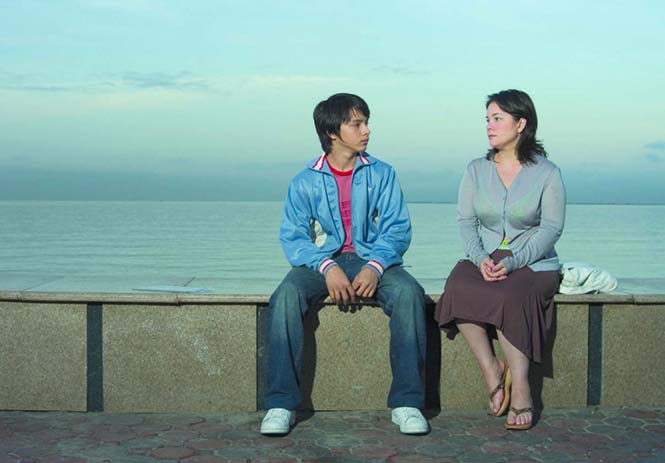Sometime in 2018, Dom Guyot started writing music as my means to cope with “whatever I was going through at that time,” he recalled. “I struggle with expressing myself a lot, especially since I’ve been misunderstood most of my life. It took an entire year of mustering up the courage to finally release… music. With merely a dream and the grit to back it up, I released ‘Not Me’, my debut single in 2019.”
Looking back, Dom said he always dreamed of being an artist – e.g. “having my own concert and just giving people iconic shows in general.”
It may have started in his youth, he smiled, when – as a little boy – “I would copy Beyonce’s concerts… in our living room.”

The interest to further a music career, however, may have started when Dom worked as a choreographer and back-up dancer to a couple of other artists in his hometown. “That experience brought me the realization that I was not meant to only be behind an artist, rather be the artist itself,” he said, adding that “not that there’s anything wrong with being a back-up, too.”
From then on, “I worked really hard to continue creating music that I would be proud of. I have an extensive archive of random songs and musings I’ve written over the years, and it was then that I revisited them and decided to take what I started up a notch. You could say that I was very stubborn — I would always have visions for my songs, and I would never stop until I get what I want.”
QUEER ARTIST IN THE HOUSE
“I have never been ashamed of my gender identity. I thought there wasn’t and is nothing to be ashamed of,” Dom said. “So yes, you could say that since day one, I have always been unapologetically queer.”
In fact, his debut single, ‘Not Me’, literally has the line, “How you caressed my body, the way I rode you daddy.”
All the same, Dom thinks that “although I would say that even if I am a queer artist, my music still caters to everyone, since I believe music has no gender and certain themes like love, especially, is universal.”
For him, it’s also nice to have people experience real-life queer stories through his music, and “have them relate to these experiences poignantly, allowing them to see that queer people are just as human as everyone else.”

GETTING SOME LOVE
Dom’s family and friends have been supportive. “That’s something I can say proudly. They’ve been patronizing the music I’ve been putting out there since I started releasing my songs. They listen to the different messages I do my best to convey, as well as support the values and opinions I’m fighting for,” he said.
Aside from that, “my stans have been the best. They literally do so much for me even when I don’t ask them to, and they’re the driving forces that keep me going every single day, especially with the release of my debut album. This is one of the reasons why I constantly want to do my best at everything I do as I want to be the artist worthy of the support everyone in my life shows me.”
ONGOING CHALLENGES
Even with his success, not everything is peachy for Dom.
“As a queer person, we know… that we are not openly invited to the table,” he said.
If there are invited to this table at all, “I couldn’t help but point out that it still feels like that invitation to the seat is done out of courtesy, and unfortunately a nod to a global pop culture shift. (And this is) something I’m trying to really change.”
In fact, Dom said he “honestly almost didn’t start making music because a person from the industry once told me that I wouldn’t succeed in this career as an openly gay artist. They said I wouldn’t be marketable no matter how talented I was. That moment, though it took a hit on my self esteem, really did open my eyes as to just how I had to succeed no matter what… By the gays, for all the gays.”
It also saddens Dom that “you see a lot of straight conventionally attractive people being celebrated for doing the bare minimum. I don’t mean to sound angsty, and I also don’t mean to dull other artists’ shine (since) we all have our own hustles and I respect that. But it really doesn’t change the fact that it is especially harder for people like us to excel regardless of how much talent, time and hard work we invest.”
Dom added: “What’s someone else’s 100% should be 300% for us. And if you think about it, there are a ton of LGBTQIA artists who have been doing the most work but aren’t given the same platforms. And if you think about it even more deeply, LGBTQIA artists have been the backbone in this industry for the longest time too — from producers to songwriters, to costume designers, hair and makeup artists, managers and even as swings (theater). It sucks, but it is what it is. I realized later on that if I want to see change, I gotta start making one… and so I worked hard, and will work hard until I am seen and heard the way I deserve… the way people like me deserve.”

ALL ABOUT INTERSECTIONS
Dom’s very presence touches on intersectional issues – e.g. he is queer, and he is making a career while living outside “imperial Metro Manila”. And he said that in your experience, these add challenges to making a mark in the local music industry.
Specific to the latter (i.e. Manila-centric artists), “there are a lot more opportunities in Manila, geography-wise and population-wise, and this is already playing to the advantage of most artists who are Manila-based,” Dom said. “But I love Cebu and the industry we have here too. Although there are a lot of challenges being based here, I will not let any of it hinder me from being heard. It’s been a mantra when I started committing to this that if opportunities don’t come, I’ll have to make some of my own.”
Dom’s genre of music is mostly centered around R&B “because it has always been home to me,” he said. “I grew up listening to R&B and soul artists like Beyonce (Destiny’s Child), TLC, Mariah Carey, Whitney Houston, Amy Winehouse, Brandy, India Arie and (others).”
It comes as no surprise, perhaps, that “I am heavily influenced by them, and effortlessly, R&B sonically resonates with me the most out of all the genres. Although this is my personal preference, I do love experimenting from genre-to-genre too, as I am really just a universal music lover.”
ART FOR RIGHTS
For Dom, can music help push for the equality of LGBTQIA people.
“For the reason that music makes you move. And I don’t mean this only in a literal sense… but really, music draws people together. It’s been witnessed time after time. Music inspires people to take action or to just reflect… ultimately pushing them to move. This is why music has been in the forefront of change in the past decades,” he said.
Of course, there are studies claiming music changes a person’s perception, and for Dom, “this means music has the power to change the way the listener sees and views the world, which I could say also amplified my personal principles and this insatiable need to fight for LGBTQIA rights. If I continue to make music that tell my story as a queer person, it may open new mental and actual doors that will let other people understand and accept us the way we deserve (as they should).”
There are other queer artists still finding their niche. And the one advice Dom said he can give is “to not adjust the music you make to the people’s level of comprehension and acceptance. Instead, challenge them and let them catch up to you. You are the way you are because you have a purpose that not a lot of people can comprehend.”
For Dom, a case in point is BTS.
“If you continue to make music that you think is what this world can only accept you for, it will show. And the cycle will continue — you will only continue to propagate what most people have been made to believe from the very beginning, as if there is something wrong with your own story, with your own truths when there isn’t. From all the ‘crying yourself to sleep’ nights, to the ‘I don’t know what’s wrong with me’ days, you are and will always be valid. Your story matters as much as mine does. You got this,” Dom ended.
To know more about Dom Guyot, or connect with him, or listen to his music, head to his Facebook page; Instagram account; or YouTube channel.

























































































